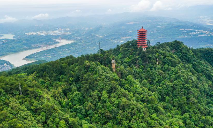Xinjiang, A Good Place to Visit, Not Arena for Competition
From May 23 to 28, Ms. Michelle Bachelet, the UN High Commissioner for Human Rights, paid a six-day visit to China, the first of its kind in 17 years.
However, before and during the visit, some Western countries were clamoring for an investigation into the human rights situation in Xinjiang and alleged that the Commissioner would not have so-called “unfettered access” in China. In the press conference on May 28th, Ms. Bachelet noted they had conversations with people from different sectors in Xinjiang, and all these meetings were “unsupervised and organized by us”. She explicitly pointed out that her visit was not an investigation, but a visit aimed to have direct discussions with the Chinese government and explore the way for “more regular, meaningful interactions in the future”.
To call the visit “an investigation” implies the presumption of guilt. Just like the origins-tracing of COVID-19, Western countries talk about lofty goals of protecting people’s health, respecting science, etc., but what they are truly aiming at is to bring down China at whatever costs and by whatever means. On Xinjiang, the US and other Western countries are seemingly questioning the human rights situation, but the real intention is to weaponize the concept of human rights and use it as a tool to interfere in other countries’ internal affairs and conduct geopolitical maneuvering.
However, facts are facts. Having experienced firsthand the real Xinjiang, Ms. Bachelet commended China’s efforts to reduce poverty and promote gender equality, and acknowledged the necessity of China’s security measures against terrorism and extremism in Xinjiang.
The biggest disinformation about Xinjiang is that the vocational centers violate human rights. Nothing could be further from the truth.
From the 1990s to 2016, rampant terrorist attacks wreaked havoc in the region. In combating terrorism, China has established vocational education and training centers. Never meant to force people to give up Islam or Uyghur language, they are for education and training so that people will be able stay vigilant against extremist ideas and upskill themselves to find jobs, in a bid to keep them from relapsing into old habits and repeating the same mistakes.
Here is a takeaway to understand how these facilities have worked. Abaydulla Omur, a 27-year-old Uygur man from Turpan, was once led astray by religious extremism — he would shout abuse when seeing girls in skirt and even forbade his own sister to go to school. His families persuaded him to go to a training center. After graduation from the center, he set up his e-commerce business to sell local fruits such as melons. In 2021, his company’s sales volume reached 32 million RMB and created over 200 job opportunities for local villagers.
In fighting terrorism, a host of policies were also rolled out to address poverty. From 2014 to 2021, the central government provided nearly 3 trillion RMB in its funding support to Xinjiang, and nearly 3.1 million people were lifted out of poverty according to current UN standards.
A happy life for all is the biggest human right. What the government has done paid off. For more than five years, Xinjiang has seen no terrorist attacks. Its GDP reached nearly 1.6 trillion RMB in 2021, up by 7%. Fifteen-year free education is now available to all children in southern Xinjiang. Basic medical insurance and serious illness insurance schemes achieved universal coverage. No wonder the High Commissioner noted, these “tremendous achievements” go a long way toward ensuring people’s “broader social and economic rights”.
In terms of human rights protection, there is always room for improvement. But at least one thing is clear: the efforts to improve people’s lives and combat terrorism in Xinjiang deserve respect and recognition. With the recent visit by the High Commissioner, it is time for some in the West to face the fact.
Photos
Related Stories
Copyright © 2022 People's Daily Online. All Rights Reserved.









